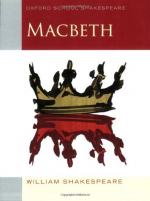|
|
Macbeth Act 3, Scene 1
Banquo enters the palace at Forres, and he is alone. He speaks to himself as if he is speaking to Macbeth when he says that Macbeth has gathered all the titles that the weird sisters foretold he would. He was the lord of Glamis, became the lord of Cawdor, and then king--fulfilling the witches' predictions. Banquo, however, suspects that Macbeth pushed the prophecy to fruition through foul play. But Banquo also remembers that the witches predicted that it would be Banquo's line that would succeed Macbeth on the Scottish throne.
Topic Tracking: Foreshadowing 6
In the midst of these murmurings Macbeth, Lady Macbeth, and the lords and attendants of the court all enter. Macbeth invites Banquo to attend a dinner banquet in the evening as an honored guest. The king and Lady Macbeth make a big production of their fondness for Banquo and the importance that he attend the evening feast. Banquo has business to take care of in another town so he must leave, but he gives Macbeth his word that he will arrive back at the palace in time for the dinner. Just before Banquo leaves Macbeth tells him that Duncan's sons Malcolm and Donalbain have been in England and Ireland "not confessing / Their cruel parricide, filling their hearers / With strange invention." Act 3, Scene 1, lines 31-3
Banquo exits and Macbeth sends the other court attendants and lords to amuse themselves for the afternoon until dinner. Everyone except Macbeth and an attendant exit the stage. Macbeth asks the attendant if the men he sent for have arrived and are willing to do what he asks. The attendant, sure that these murderers will follow the king's orders, goes to fetch the murderers who are waiting outside the palace.
While the attendant is gone, Macbeth spouts off about the danger that Banquo poses to Macbeth's position as king. Macbeth also remembers the witches' prophecy that Banquo's line would rule Scotland after Macbeth, and so Macbeth knows that in order to prevent such a thing, he must destroy Banquo and his son, Fleance. Macbeth believes that Banquo has a royal and commanding air about him that threatens Macbeth more than the fear of murdering Banquo. To prevent Duncan's murder being wasted on Banquo's line, Macbeth knows that he must kill the lord and his son. That is why he has called upon the murderers who wait outside the palace.
The attendant brings in the two murderers. The king speaks with them recapping a conversation they had the day before about Banquo. Macbeth has convinced these beggars turned murderers that Banquo is responsible for their ill fortune. Macbeth goads them into a rage that demands Banquo's death and the death of his son, Fleance, to satisfy their vengeance. Macbeth tells the murderers that Banquo is also his own enemy. He explains that he wishes to see Banquo destroyed but cannot do so himself because of mutual, powerful friends who would be upset to see Banquo killed. Therefore, Macbeth entreats the murderers to kill Banquo, their enemy as well as his, but to keep it under wraps that the king wanted Banquo dead. The murderers agree to lie in wait for Banquo and Fleance as they come back to the palace that night for the dinner that Macbeth has insisted that they attend. The trap is set.




